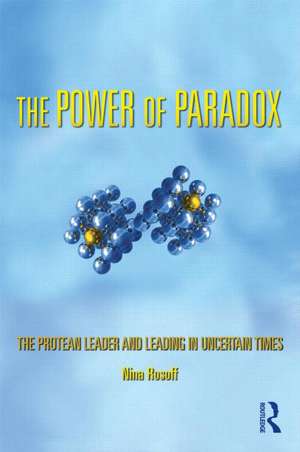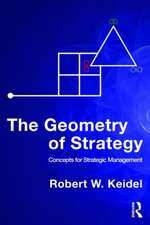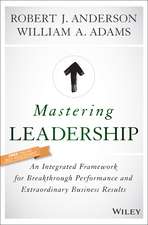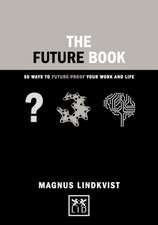The Power of Paradox: The Protean Leader and Leading in Uncertain Times
Autor Nina Rosoffen Limba Engleză Paperback – 20 iun 2011
This book gives a glimpse into why and how this happens, and what to do about it.
Understanding the Power of Paradox can empower leaders in uncertain times. Paradox reveals uncertainty giving leaders room to breathe and time to think, better able to deal with ambiguity and manage complexity, no longer stymied. Learning to think differently and behave with capabilities, you already have, more resilient, adaptive and flexible leaders execute conscious actions effectively, inspire and empower others, creating the consequences they intend, successful Protean Leaders.
Preț: 383.93 lei
Nou
Puncte Express: 576
Preț estimativ în valută:
73.46€ • 76.70$ • 60.80£
73.46€ • 76.70$ • 60.80£
Carte tipărită la comandă
Livrare economică 04-18 aprilie
Preluare comenzi: 021 569.72.76
Specificații
ISBN-13: 9780415875110
ISBN-10: 0415875110
Pagini: 240
Ilustrații: 20 b/w images, 1 table, 10 halftones and 20 line drawings
Dimensiuni: 152 x 229 x 15 mm
Greutate: 0.32 kg
Ediția:New.
Editura: Taylor & Francis
Colecția Routledge
Locul publicării:Oxford, United Kingdom
ISBN-10: 0415875110
Pagini: 240
Ilustrații: 20 b/w images, 1 table, 10 halftones and 20 line drawings
Dimensiuni: 152 x 229 x 15 mm
Greutate: 0.32 kg
Ediția:New.
Editura: Taylor & Francis
Colecția Routledge
Locul publicării:Oxford, United Kingdom
Cuprins
1. Paradox 2. What Is Paradox 3.The Connection Paradox 4. The Decision Paradox 5. The Growth Paradox 6. The Static Organization Paradox 7. The More Paradox 8. The Meaning Paradox 9. The Purpose Paradox 10. We Need a New Kind of Leader 11. Investing in Paradox and Uncertainty
Notă biografică
Nina Rosoff PhD is an Organization Behavioral Economist and Scientist. She has 45 years of experience researching, teaching as a practitioner/consultant and writer/author examining this area in business and in academia. Her career has been accounting for this slippery slope in an effort to make it useful to organization leader’s success, economically and as human beings.
Her interest in hidden processes, paradox, dilemma and ironies and impossible decisions leaders face everyday is not today, nor was it forty-five years ago, part of standard economics. This brought Rosoff face to face with the unattended dilemma of economics; how to lead in uncertainty and paradox. Simple problems afford simple answers. Complex problems require complex answers. The economy is a very complex problem. The more complex the problem the more leaders do nothing.
What she observed working with global leaders at all organization levels is their tendency to simplify complex problems in order to offer a solution. The complexity of the economy does not go away. Leaders ignore and lose sight of this complexity by denying its presence not because they want to, but because of their own human inadequacies and ego limitations. The result is most leaders do not embrace ambiguity and manage complexity.
This is the challenge she took on. How might Rosoff find one small, apparently unrelated, inconsequential organization behavioral economic idea to empower leader’s success 51% of the time by executing intended consequences, rather than failing 51% of the time because their best of intentions result in what she calls The Law of Unintended Consequences?
In 2010/2011, organizational behavioral economics is the platform for Rosoff’s book. It is where organizations, human beings and money meet.
Her book brings organization behavioral economics into standard economics by offering leaders a way to embrace ambiguity and manage complexity rather than ignore it or deny its presence. Less stymied they are able to think dynamically with better human intelligence consistently successful economically, organizationally and as leaders.
Her interest in hidden processes, paradox, dilemma and ironies and impossible decisions leaders face everyday is not today, nor was it forty-five years ago, part of standard economics. This brought Rosoff face to face with the unattended dilemma of economics; how to lead in uncertainty and paradox. Simple problems afford simple answers. Complex problems require complex answers. The economy is a very complex problem. The more complex the problem the more leaders do nothing.
What she observed working with global leaders at all organization levels is their tendency to simplify complex problems in order to offer a solution. The complexity of the economy does not go away. Leaders ignore and lose sight of this complexity by denying its presence not because they want to, but because of their own human inadequacies and ego limitations. The result is most leaders do not embrace ambiguity and manage complexity.
This is the challenge she took on. How might Rosoff find one small, apparently unrelated, inconsequential organization behavioral economic idea to empower leader’s success 51% of the time by executing intended consequences, rather than failing 51% of the time because their best of intentions result in what she calls The Law of Unintended Consequences?
In 2010/2011, organizational behavioral economics is the platform for Rosoff’s book. It is where organizations, human beings and money meet.
Her book brings organization behavioral economics into standard economics by offering leaders a way to embrace ambiguity and manage complexity rather than ignore it or deny its presence. Less stymied they are able to think dynamically with better human intelligence consistently successful economically, organizationally and as leaders.
Recenzii
'A useful account of how some of today’s leaders view the critical paradoxes that will face them in tomorrow’s world and why Protean Leadership may be the way of the future.'—Edgar H. Schein, Professor Emeritus, MIT Sloan School of Management
'For those of us responsible for leading our organizations, communities, and countries into a better era, uncertainty and conflict keep us up at night and send us to the medicine, or liquor, cabinet. Nina Rosoff has, in The Power of Paradox, helped us make sense of these paradoxes, and some we might not see because we are blinded by singular simplicity. She engages us with tantalizing stories that give us hope. She lights the way to leverage the energy of these paradoxes and use the opportunity for innovation, growth, and deeper contribution.'—Richard E. Boyatzis, Distinguished University Professor, Case Western Reserve University, scholar and co-author of two international best sellers, Primal Leadership and Resonant Leadership
'In my leadership course we discuss leader style, situational factors, and the follower role, but we have paid little attention to leader flexibility, adaptability, and the concept of paradox. That will now change thanks to Nina Rosoff. In my other course on organization change, we talk about the importance of today’s organization being agile, nimble, and adaptive. But how can an organization be such if the leader of that organization is not? Again, thanks to Nina Rosoff, we can now put these two (leader and organization) together more easily; indeed a terrific contribution from her.'- Warner Burke, PhD, Edward Lee Thorndike Professor of Psychology and Education, and Chair of the Department of Organization and Leadership, Teachers College, Columbia
'Nina Rosoff’s The Power of Paradox captures the crux of modern leadership—how to deal with the paradoxes that inherently arise in complex organizations facing rapidly changing environments. It pulls no punches and offers no easy solutions. It challenges leaders to harvest the power of paradox by becoming 'protean' or changeable and thinking dynamically. Based on Rosoff’s extensive experience developing leaders and insightful interviews with veteran executives, the book provides real-life lessons for leading in the face of uncertainty.'—Thomas G. Cummings, Professor of Management and Organization, Marshall School of Business, University of Southern California
'Based on her vast experience with organizations and fascinating interviews with both named and anonymous leaders in many areas of life, Nina Rosoff identifies seven paradoxes that they must all confront. Full of real stories, the issues come alive in this book. And though it may sound unorthodox, the Protean Leadership Model she develops provides insight and hope to all who wish to lead successfully in this uncertain time.'—Lotte Bailyn, Professor of Management, MIT Sloan School of Management
Descriere
The Power of Paradox: The Protean Leader and Leading in Uncertain Times Describes seven leadership paradoxes that are inherent in running today’s complex and changing organizations. They represent the fundamental issues that modern leaders must recognize and deal with effectively to succeed.















